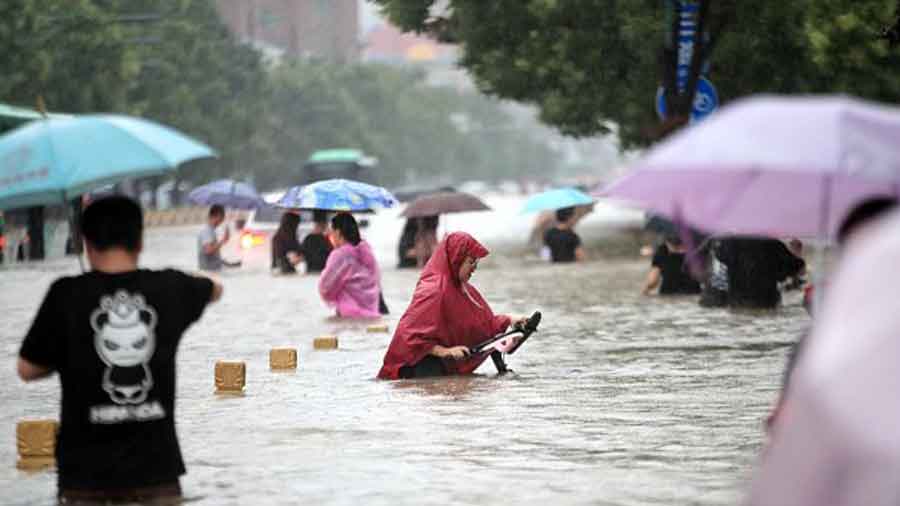Swift Action
Ever heard of a senior official being punished for the floods that have submerged Indian capitals in the last two years? Well, in China, where even the way you report natural disasters is circumscribed by State censorship, the mayor of a city has been replaced, a vice-mayor dismissed, and its 57-year-old Communist Party chief demoted. Eight persons have been arrested, and 90 officials punished with Party disciplinary measures, for the floods that devastated Zhengzhou, the capital of Henan province, and its surrounding areas, in July 2021. The floods killed 398 people, of which 380 were in Zhengzhou. The official figure of deaths at the time of the flood was 302.
The image of commuters gasping for air as flood water rose up outside their train compartments in Zhengzhou’s subway became the international image of the floods. At least 12 commuters died in that train; six more lost their lives in a flooded underground road tunnel.
The disaster was ascribed to the unprecedented rains: 617 millimetre, that fell in three days, was almost as much as the 640 mm that the city receives in a year. Yet, almost immediately, Zhengzhou’s residents were asking why did the train travel so far given that the subway was already getting flooded? Why was everything open when warnings of torrential rains had already been given? Most importantly, what happened to the plans to make Zhengzhou a “sponge city’’, one that could absorb heavy rains without going under?
Whether it was the international attention given to the disaster or the incessant questioning by citizens, within a fortnight of the floods, the government set up a high-level investigation team, unprecedented in its scale and depth, which summoned about 450 people and conducted more than 100 field surveys.
Ignored signs
The report, submitted around a fortnight ago, indicts the city’s authorities for negligence and dereliction of duty. Five ‘red alerts’ (requiring the suspension of all educational and business institutions) for heavy rains were ignored, it found. The authorities hesitated in declaring the situation as the highest level of emergency, which would have initiated suitable responses. This delay resulted in avoidable deaths, at least in the metro and tunnel, says the report. The heads of the city’s emergency management bureau and the Zhengzhou metro are among those probed, and among those arrested is a design head of the metro.
Interestingly, this hesitation to take crucial decisions was highlighted on the internet right then by an anonymous metro employee as a contributory factor for the deaths. The report describes this as “the practices of formalities for formalities’ sake and bureaucratism.” Officials have also been punished for under-reporting the numbers of deaths and missing persons.
How far removed the promise of a “sponge city” was from the reality of Zhengzhou is also highlighted by the report. Henan’s capital had only half the length of storm sewage pipelines, compared to other cities of the same size, and lacked facilities to drain waterlogging in subways and tunnels.
The report contains a damning indictment of the city authorities. Ignoring signals sent out by climate change across the world, the officials believed that Zhengzhou would never receive rains enough to cause flooding and landslides. The pursuit of “fast development” had ignored vital drainage requirements. Finally, there was no coordinated response under unified command. “At critical moments, there was no leading official in the command center. They didn’t know the general situation of the disaster in the city. Neither did they manage to learn about major hazards in a timely manner.”
All of this applies to Chennai, Mumbai, Jaipur and other Indian capitals that have been flooded. But will their officials ever be punished for similar crimes by the government?











